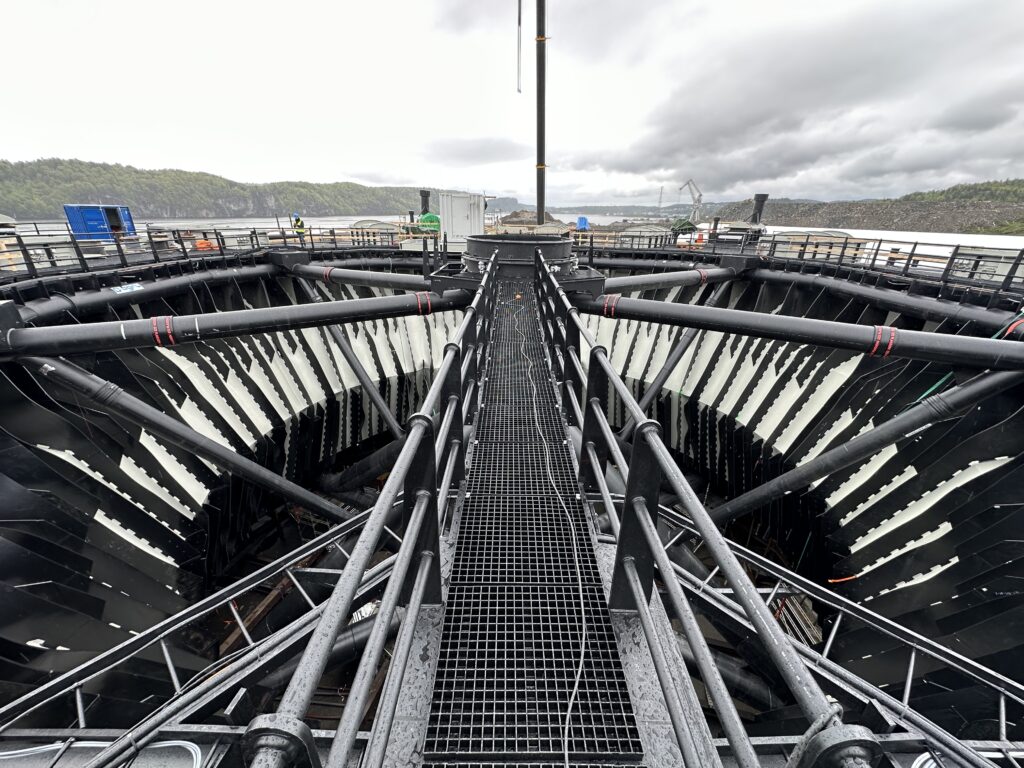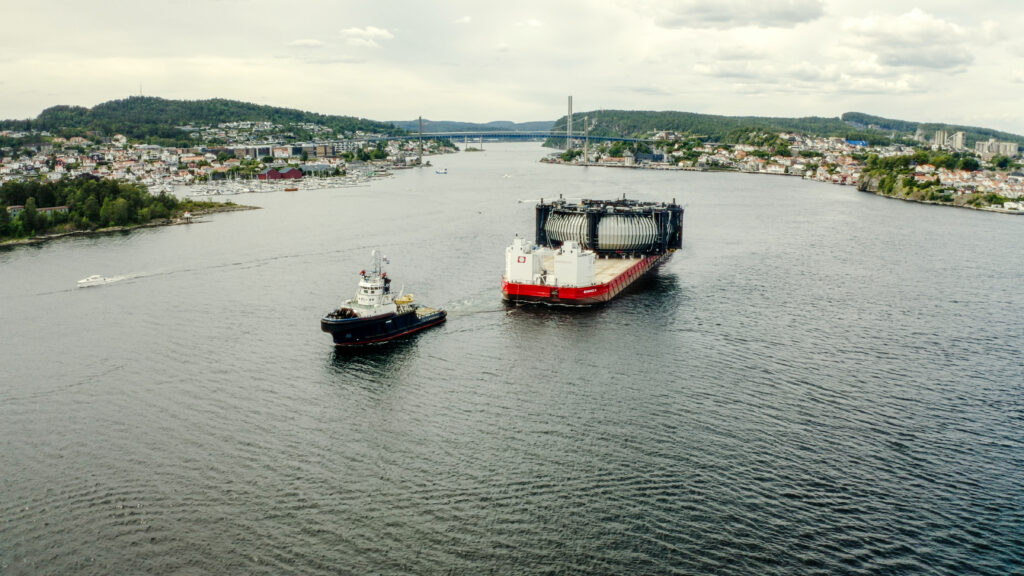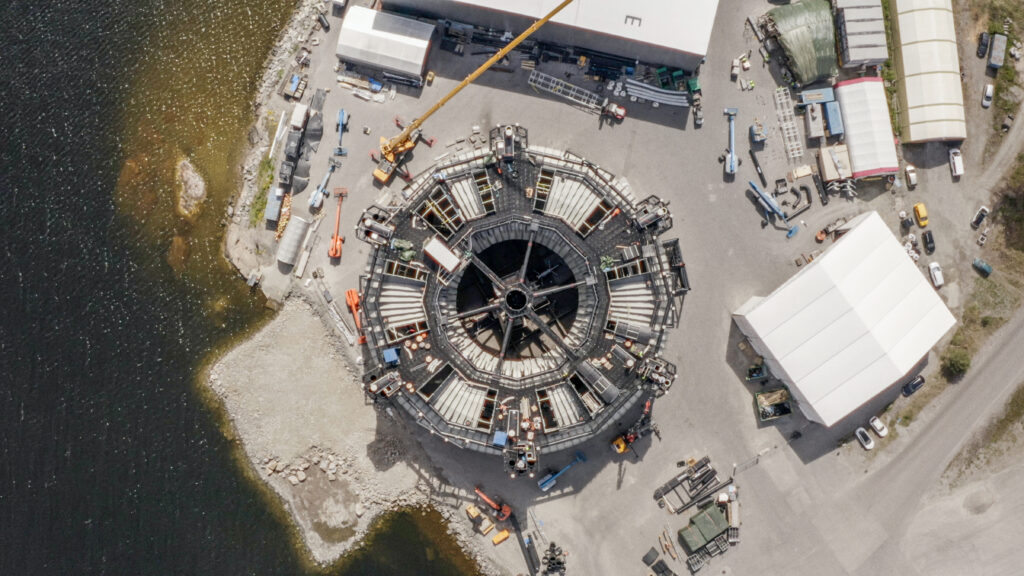The Norwegian company Bluegreen AS has successfully implemented a groundbreaking aquaculture project, the Marine Donut. This closed floating fish farming system, made from the highly crack-resistant plastic PE 100-RC, was installed on a salmon farm owned by SalMar in Norway. This innovative facility, whose PE 100-RC components were supplied entirely by AGRU, marks the beginning of a new era of sustainability in salmon farming.
[Georgetown, South Carolina, August 30, 2023 —] AGRU takes massive strides in aquaculture through its participation in an innovative approach to fish farming. With an outer diameter of 180 feet, a height of over 55 feet, and a total weight of around 660 tons, the Marine Donut is the world’s largest thermoplastic structure. The unique design of this floating fish farm has the potential to revolutionize salmon farming.
The outstanding design of the Marine Donut creates a controlled environment that reduces stress for the fish and allows them to grow healthier. Due to its sustainability and cost-efficiency, this solution is intended to replace traditional net cages. The Marine Donut can accommodate up to 200,000 salmon weighing 5.5 pounds each, which remain in the facility until they reach their harvest weight of about 12 pounds.


Groundbreaking innovations
The innovation of the Marine Donut lies in its enclosed structure. It allows for the protection and maintenance of salmon health by shielding them from parasites such as sea lice. The introduction of filtered deep water prevents the incursion of salmon lice. Inside the facility, food residues and fish excrement are collected as sludge and pumped to land for environmentally friendly disposal. This process not only minimizes the environmental impact of salmon farming but also prevents the spread of diseases.
Another noteworthy feature of the Marine Donut is the use of an artificial current channel that simulates the flow of a river around the ring-shaped structure of the facility. As a result, the fish are constantly moving, which positively affects their health. Furthermore, the construction is equipped with ballast tanks, which allow the donut to be raised and lowered, or tilted, in the sea. By tilting the structure, the harvest-ready fish can be guided into a connected tube and transported to the factory ship for further processing without injury.
Plastic technology from AGRU
AGRU played a vital role in the implementation of this ambitious project by manufacturing and delivering all PE 100-RC components for the more than 770,000 ft3 Marine Donut. The deliveries included 440 tons of agate grey and black plastic sheets made of PE 100-RC, as well as 220 tons of PE 100-RC piping systems and E-fittings with outer diameters of up to 47 inches. In addition, AGRU made a significant contribution through its comprehensive application-technical consulting.
“We are proud that we were able to make a significant contribution to the realization of this revolutionary aquaculture technology with our expertise and high-quality materials,” explains Albert Lueghamer, Head of the Technical Department at AGRU. “The close collaboration with Bluegreen AS and AGRU’s deep understanding of the challenges of thermoplastic products in salt water have significantly contributed to the successful implementation of the project.”
To facilitate the handling of the plastic sheets during installation and to reduce cutting on-site, AGRU manufactured them in a special custom format. On the construction site, the precise curvature of the sheets was ensured by bending them over a round formwork. After they had taken the correct shape, the sheets were joined together using butt welding. The construction of the Marine Donut also uses special stiffening ribs made from black PE sheets. They are the result of a calculation based on the finite element method, which was used for the precise strength and deformation analysis of the complex geometric form.

Sustainability thanks to thermoplastics
Peter Undeutsch, Head of Sales at AGRU, emphasizes the forward-looking importance of using plastics in marine applications. “The Marine Donut is a milestone in aquaculture and demonstrates the enormous potential of thermoplastics in this field. We will continue to apply our extensive experience and knowledge in plastic technology to support the development of the aquaculture industry.”
Aquaculture can contribute to nearly all of the U.N. Sustainable Development Goals, with eliminating hunger and improving health at the top of the list. To support this effort, investments toward creating innovations like the Marine Donut should be encouraged.
“North America is seeing increased interest in aquaculture,” says Edgardo Cornejo, Chief Operations Officer at AGRU America, Inc., “and with this timely project spearheaded by our colleagues in Austria, we believe this is the perfect opportunity to market AGRU products as key materials for the fabrication of innovative aquaculture technologies.”
About AGRU America, Inc.
Since 1988, AGRU America, Inc. has been dedicated to creating a sustainable future by utilizing innovative engineering plastics solutions to protect human health, conserve vital resources, and modernize infrastructure. AGRU America prioritizes building relationships with the highest quality, service, and dependability standards. AGRU America is a subsidiary of AGRU Kunststofftechnik GmbH, an Austrian family-owned business since 1948. AGRU has production facilities in Austria, the United States, and China. AGRU’s state-of-the-art products, including geosynthetics, concrete protective liners, pipes and fittings, and semi-finished products, are distributed in over 100 countries worldwide. Discover more about AGRU America at https://www.agruamerica.com.